Compressors play a crucial role in various industries, providing the power needed to perform tasks such as powering pneumatic tools, sandblasting, and even operating HVAC systems. For businesses or individuals in need of a compressor for a specific project or on a temporary basis, renting proves to be a cost-effective solution. However, understanding the factors that influence compressor rental costs is essential for making informed decisions. In this article, we will explore the key elements that contribute to the pricing of compressor rentals and provide valuable tips for maximizing cost-efficiency.
Type of Compressor
The type of compressor required for a particular task significantly impacts rental costs. Compressors come in various types, including reciprocating compressors, rotary screw compressors, and centrifugal compressors. Reciprocating compressors, which use pistons to compress air, are generally more affordable to rent compared to their rotary screw and centrifugal counterparts. However, the suitability of a specific type depends on the nature of the project and the required air volume and pressure.
Size and Capacity
The size and capacity of the compressor play a pivotal role in determining rental costs. Larger compressors with higher capacities are generally more expensive to rent due to their ability to deliver greater air volumes and pressures. Understanding the specific requirements of the project is crucial in selecting the appropriate size and capacity, as renting an oversized compressor can lead to unnecessary expenses.
Duration of Rental
The duration for which the compressor is needed directly influences the rental cost. Rental companies often offer flexible pricing structures based on the rental period, with discounts for longer-term rentals. It is advisable for renters to carefully assess the project timeline and negotiate a rental agreement that aligns with their needs. Short-term rentals may have higher daily rates, while long-term commitments may result in more favorable overall costs.
Delivery and Pickup
The logistics involved in delivering and picking up the compressor also contribute to the overall rental expenses. The distance between the rental company’s location and the project site, as well as the method of transportation, can impact costs. Renters should consider proximity to rental providers to minimize transportation expenses and explore options such as self-pickup to potentially reduce costs.
Fuel Type and Efficiency
The fuel type and efficiency of the compressor can affect operational costs during the rental period. Diesel-powered compressors are common for their portability, but fuel costs can add up, especially for extended projects. Electric compressors may offer cost savings, but access to a reliable power source is crucial. Renters should evaluate the fuel efficiency of the chosen compressor type and factor in fuel costs when budgeting for the rental.
Maintenance and Service
Compressor rental costs often include maintenance and service fees. It is essential to clarify the terms of maintenance and service with the rental provider to ensure that the compressor operates efficiently throughout the rental period. Regular maintenance can prevent breakdowns and delays, minimizing the risk of additional costs associated with equipment failures.
See Also: How Much Does It Cost To Replace An Ac Compressor?
Tips for Cost-Efficient Compressor Rentals
Thoroughly Assess Project Requirements: Before approaching a compressor rental, conduct a comprehensive assessment of the project requirements. Determine the necessary air volume, pressure, and duration to select the most suitable compressor type, size, and capacity.
Compare Rental Providers: Research and compare multiple compressor rental providers to identify competitive pricing and favorable terms. Consider factors such as equipment quality, customer reviews, and additional services offered by the rental company.
Negotiate Rental Terms: Negotiate rental terms based on the specific needs of the project. Discuss the duration of the rental, delivery and pickup logistics, and any available discounts for long-term commitments.
Optimize Size and Capacity: Choose a compressor with the appropriate size and capacity for the project to avoid overspending on unnecessary features. Discuss your requirements with the rental provider to receive guidance on selecting the most cost-effective option.
Explore Fuel Efficiency: If the project allows, explore compressor options with better fuel efficiency. This can result in substantial cost savings, especially for projects with extended durations.
Understand Maintenance Policies: Clearly understand the maintenance policies of the rental provider. Ensure that routine maintenance is included in the rental agreement to prevent unexpected breakdowns and additional costs.
Consider Self-Pickup: If feasible, consider self-picking the compressor to minimize delivery and pickup costs. Assess the availability of suitable transportation and the convenience of this option for your project.
Plan for Contingencies: Anticipate potential challenges and plan for contingencies to avoid unexpected costs. This may include factors such as adverse weather conditions, project delays, or changes in equipment requirements.
Conclusion
Renting a compressor can be a cost-effective solution for projects requiring temporary access to compressed air. By understanding the factors that influence compressor rental costs and implementing cost-efficient practices, businesses and individuals can optimize their budgets while ensuring the successful completion of their projects. Thorough research, effective communication with rental providers, and a clear understanding of project requirements are key elements in achieving a cost-effective and seamless compressor rental experience.

